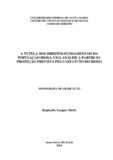| dc.contributor.advisor | De Gregori, Isabel Christine Silva | |
| dc.creator | Miotti, Raphaella Vasques | |
| dc.date.accessioned | 2017-08-21T17:07:48Z | |
| dc.date.available | 2017-08-21T17:07:48Z | |
| dc.date.issued | 2014-12-01 | |
| dc.date.submitted | 2014 | |
| dc.identifier.uri | http://repositorio.ufsm.br/handle/1/11497 | |
| dc.description | Trabalho de conclusão de curso (graduação) - Universidade Federal de Santa Maria, Centro de Ciências Sociais e Humanas, Curso de Direito, RS, 2014. | por |
| dc.description.abstract | The number of people reaching the elder age grows exponentially in Brazil, putting in focus the protection of the elderly, mostly concerning the effectuation of their Fundamental Rights, which grant them dignity. In this direction, emerges the demand for different Public Policies which respond their needs and confirm special protection due to their social fragility. With this goal, were promulgated special Laws for the protection of the elderly, as the Law 8.842/94 and the Law 10.741/03, known as the Statute of Elderly, result of the constant fight of this sector. However, it is well known that the mere publication of a Law does not guarantee the effectiveness. Therefore, this paper has as main goal analyze the existing legislation and assure in what measure it guarantee the respect and effectiveness of the Fundamental Rights of elderly people. For that, it is utilized the deductive method of approach, starting from an general analysis of the protective legislation to the elderly, expecting achieve a conclusion about the effectiveness of the Elderly institute for the custody of their Fundamental Rights and which perspective of the protection effectiveness of the elderly in the country. It is implied that there are plenty protective legislation to the elderly in Brazil, however, it is not applied in a satisfactory way and it does not become full effective in the protection of the Fundamental Rights of elderly people, this occurs such for the lack of awareness of the population about its subject as for the neglect of the Public Power in the execution of the Public Policies assuring its concretion. | eng |
| dc.language | por | por |
| dc.publisher | Universidade Federal de Santa Maria | por |
| dc.rights | Acesso Aberto | por |
| dc.subject | Direitos fundamentais | por |
| dc.subject | Direitos dos idosos | por |
| dc.subject | Estatuto do idoso | por |
| dc.subject | Velhice | por |
| dc.subject | Família | por |
| dc.title | A tutela dos direitos fundamentais da população idosa: uma análise a partir da proteção prevista pelo Estatuto do Idoso | por |
| dc.title.alternative | The protection of fundamental rights of the elderly: a review from the protection provided by the Statute of Elderly | eng |
| dc.type | Trabalho de Conclusão de Curso de Graduação | por |
| dc.degree.local | Santa Maria, RS, Brasil | por |
| dc.degree.graduation | Direito | por |
| dc.description.resumo | O número de pessoas atingindo a terceira idade cresce exponencialmente no Brasil, colocando
em foco a proteção dos Idosos, sobretudo quanto ao respeito e efetivação de seus Direitos
Fundamentais, os quais lhe garantem dignidade. Nesse sentido, surge a demanda por Políticas
Públicas diferenciadas que atendam suas necessidades e lhes confiram proteção especial em
decorrência de sua fragilidade social. Com esse objetivo, foram promulgadas Leis específicas
em proteção aos Idosos, como a Lei 8.842/94 e a Lei 10.741/03, conhecida como Estatuto do
Idoso, resultante de constante luta deste setor. Contudo, sabe-se que a mera publicação de uma
Lei não garante a sua efetividade. Assim, este trabalho tem por objetivo analisar a legislação
existente e averiguar em que medida ela garante o respeito e efetivação dos Direitos
Fundamentais das pessoas idosas. Para tanto, utiliza-se o método de abordagem dedutivo,
partindo-se de uma análise geral da legislação protetiva ao idoso, pretendendo-se chegar a uma
conclusão sobre a eficácia do Estatuto do Idoso para a tutela de seus Direitos Fundamentais e
quais as perspectivas de efetivação da proteção dos idosos no país. Analisou-se que, embora
haja farta legislação protetiva ao Idoso no Brasil, a mesma não é aplicada de forma satisfatória,
não se tornando plenamente efetiva na proteção dos Direitos Fundamentais das pessoas idosas,
e isso ocorre tanto pela falta de conscientização da população acerca de seu conteúdo, quanto
pelo descaso do Poder Público na execução de Políticas Públicas assegurando sua
concretização. | por |
| dc.publisher.country | Brasil | por |
| dc.publisher.initials | UFSM | por |
| dc.subject.cnpq | CNPQ::CIENCIAS SOCIAIS APLICADAS::DIREITO | por |
| dc.publisher.unidade | Centro de Ciências Sociais e Humanas | por |


